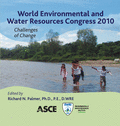Water Quality Management in the Context of Climate Change: Importance for Adapting Critical Condition and Uncertainty Analysis in the Threshold or Scenario Approach
Publication: World Environmental and Water Resources Congress 2010: Challenges of Change
Abstract
Climate change will have numerous and diverse impacts on the environment, including those on ambient water quality. In areas projected to experience decreased runoff (e.g., in many semiarid areas), water quality deterioration will be even more pronounced. The number of waterbodies recognized as impaired is likely to increase, even if pollution levels remain stable. However, projected climate change impacts on ambient water quality and Total Maximum Daily Load (TMDL) have been studied relatively little. The objectives of this paper are to review available water quality studies in the context of climate change and recommend ways in which a few key issues in water quality programs (e.g. critical condition, uncertainty analysis) should be adapted to reinforce effective water quality management in a changing climate. This paper reviewed water quality issues in a climate change context from several available studies that extend to different waterbody types (stream, lake, and estuary) and conducted a preliminary comparison between threshold approach and scenario approach. It also provided a summary of threshold approach and scenario approach, including major advantage and disadvantage of both approaches, for evaluating climate change impact on ambient water quality and related TMDL program. Case studies reviewed in this paper included climate change evaluation on long-term water quality by U.S. Environmental Protection Agency (USEPA) Chesapeake Bay Program and consideration for incorporating climate uncertainty in the upcoming Bay TMDL, a river in Mid-Atlantic region using USEPA BASINS Climate Assessment Tool, and a nutrient-impaired lake in the Northeast. In response to the statement that "stationarity should no longer serve as a central, default assumption in water-resource risk assessment and planning", trade-offs need to be made between ambient water quality simulations using either long-term historical data series or stochastic predictions of such data based on properties of the historical time series. It is important to assess the pollutant loading estimate and future effectiveness of a water quality program or TMDL implementation plan under projected climate change scenarios as well as under different management actions in response to climate. The water quality management and permitting programs will need to adapt by considering the long-range implications for waterbody impairment associated with climate change and make needed revisions to TMDL guidance and water quality-based effluent limitations (e.g. under future "lower low-flow" condition). Ongoing studies will equip policymakers with the information and decision tools required to cost-effectively adapt to climate change impacts on water quality management.
Get full access to this chapter
View all available purchase options and get full access to this chapter.
Information & Authors
Information
Published In
Copyright
© 2010 American Society of Civil Engineers.
History
Published online: Apr 26, 2012
Authors
Metrics & Citations
Metrics
Citations
Download citation
If you have the appropriate software installed, you can download article citation data to the citation manager of your choice. Simply select your manager software from the list below and click Download.
